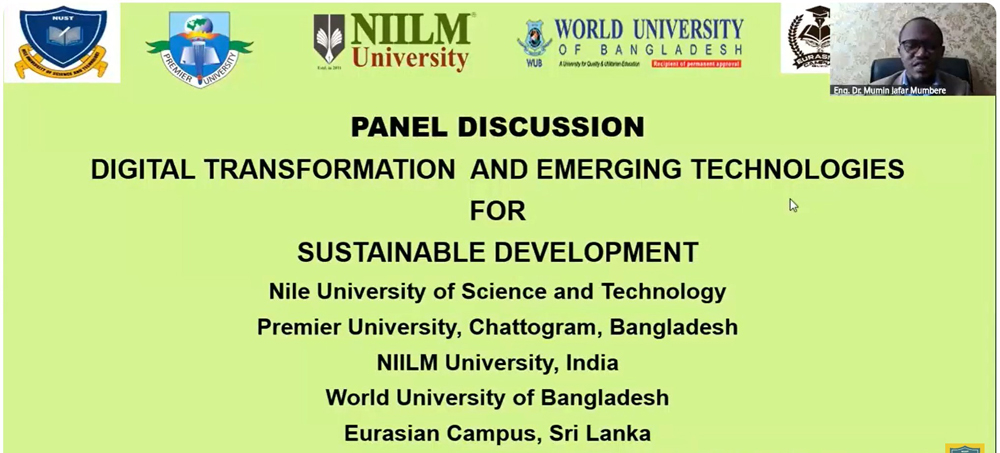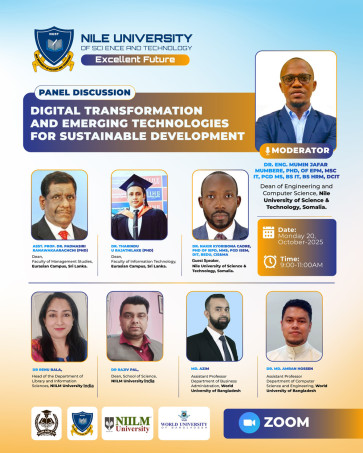
An International Seminar on “Digital
Transformation and Emerging Technologies for Sustainable Development” was
successfully organized, bringing together distinguished academics, industry
experts, researchers, IT professionals, and students from around the world to
explore the transformative role of technology in achieving the Sustainable
Development Goals (SDGs).
This prestigious event was jointly organized
by World University of Bangladesh (WUB), Eurasian University (Sri Lanka), NIILM University (India), and Kesmonds International University
(Cameroon).
The seminar focused on how digital
transformation and emerging technologies are reshaping global societies,
industries, and economies. Discussions centered around leveraging innovation to
address critical challenges related to climate change, healthcare access,
quality education, and economic inclusion, ultimately contributing to
sustainable and inclusive development.
The event was moderated by Professor Dr.
Eng. Mumin Jafar Mumberi, Dean of Engineering and Computer Science, Nile
University of Science and Technology, who emphasized that the world is
undergoing a technological revolution. He highlighted that digital innovation
is driving efficiency, resilience, and sustainable growth worldwide.
Dr. Tuton Chandra Mallick, Chairman
& Associate Professor, Department of Electrical and Electronic Engineering,
Premier University, Chattogram, discussed the potential of technology-driven
solutions for water scarcity. He presented groundbreaking research on greywater
technology, which recycles wastewater for reuse in gardening, sanitation, and more—significantly
contributing to water conservation and sustainable living.
Dr. C. K. Nakir delivered
a presentation on “Education, Society, and Policy in the Digital Age”,
outlining how digital transformation can minimize disparities between urban and
rural learners. He stressed the importance of equitable access to digital
infrastructure, digital literacy, and a strong policy framework to ensure
inclusive education and SDG achievement.
Asst. Prof. Dr. Padmasiri Ranawakaarachchi (PhD), Dean, Faculty of Management Studies, Eurasian Campus, Sri Lanka,
presented “Challenges in Human Resource Management in the Era of Digital
Transformation”. He demonstrated how emerging technologies in HR analytics,
automation, cybersecurity, and employee wellness contribute to SDG 8 (Decent
Work and Economic Growth) and SDG 9 (Industry, Innovation, and Infrastructure).
Dr. Md. Amran Hossen, Assistant
Professor, World University of Bangladesh, showcased the application of
Artificial Intelligence and Machine Learning in IoT to improve human
well-being. He shared real-world examples of how AI-powered monitoring systems
can safeguard elderly individuals living alone, enhancing safety, privacy, and
dignity.
Also representing WUB, Md. Azim,
Assistant Professor, Department of Business Administration, participated in the
seminar.
Dr. Tharindu U Rajathilake (PhD), Dean,
Faculty of Information Technology, Eurasian Campus, Sri Lanka, presented
“Artificial Intelligence for Sustainable Development through Transforming
Education Management.” He outlined how AI can innovate the education sector
through smart administration, personalized learning, early detection of at-risk
students, and bridging rural-urban education gaps, while reinforcing ethical
academic practices.
The seminar concluded with a shared vision:
emerging digital technologies are key enablers of a sustainable future. The
event successfully fostered international collaboration, knowledge-sharing, and
strategic dialogue to accelerate technology-driven progress toward the Sustainable
Development Goals.




